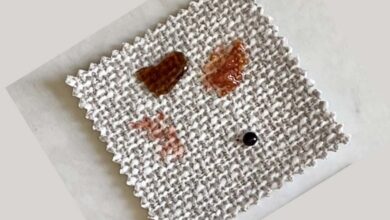Does Fabric Softener Expire? Know The Secret True

Are you wondering, does fabric softener expire? Yes, Fabric softener does expire, but the expiration date varies by brand and formulation. Fabric softener is a common household product that helps to soften and freshen your laundry.
It is typically used in the final rinse cycle to reduce static electricity and make clothes feel softer. However, like other products, fabric softener does have an expiration date. The expiration date of fabric softener depends on the specific brand and formulation.
Some fabric softeners may expire after a certain period, while others may have a longer shelf life. It is important to check the expiration date on the packaging of your fabric softener to ensure that it is still effective and safe to use. We will explore the topic of fabric softener expiration in more detail.
Does Fabric Softener Expire?
Fabric softener is a common laundry product that helps to keep our clothes soft, fresh, and static-free. But have you ever wondered if fabric softener can expire? Understanding the shelf life of fabric softeners is vital to ensure their effectiveness and avoid using a product that may be past its prime.
Let’s delve into the factors affecting the shelf life of fabric softeners and how the chemical composition, temperature, and storage conditions impact their expiration.
Factors Affecting The Shelf Life Of Fabric Softener
Fabric softeners, like any other product, can deteriorate over time due to various factors. Here are some key points to consider:
- Chemical composition: Fabric softeners contain a combination of chemicals that provide the desired softness and fragrance to our clothes. Over time, these chemicals can break down, losing their effectiveness and altering the quality of the fabric softener.
- Exposure to air and light: Oxygen and UV light can accelerate the degradation process of fabric softeners, leading to shorter shelf life. It is essential to store fabric softeners in tightly sealed containers, away from direct sunlight, to minimize exposure to these elements.
- Contamination: Fabric softeners can become contaminated with bacteria, mold, or fungi if the container is not properly sealed or if the product comes into contact with dirty hands or surfaces. These contaminants can reduce the shelf life of the fabric softener and pose a risk to your laundry.
The Chemical Composition Of Fabric Softener
Fabric softeners usually consist of cationic surfactants, fragrances, and other additives. Understanding the chemical composition helps us comprehend how it affects the expiration of fabric softeners. Here’s a breakdown:
- Cationic surfactants: These compounds reduce static electricity in fabrics and provide a soft touch. Over time, cationic surfactants can become less effective, diminishing the softening properties of the fabric softener.
- Fragrances: The pleasant scent of fabric softener is due to adding fragrances. However, these fragrances can fade or change over time, affecting the overall freshness of your laundry.
- Additives: Fabric softeners may contain additives like colorants, preservatives, and antistatic agents. These additives can also deteriorate over time, impacting the efficacy of the fabric softener.
How Temperature And Storage Conditions Impact Expiration
Proper storage of fabric softener is crucial to maintain its shelf life. Temperature and storage conditions can significantly affect the expiration of fabric softeners. Consider the following:
- High temperatures: Exposure to high temperatures can cause the chemical components of fabric softeners to degrade more rapidly. It is advisable to store fabric softener in a cool and dry place to extend its shelf life.
- Humidity: High humidity levels can lead to moisture absorption, which can degrade the quality of fabric softeners. It is essential to keep fabric softeners away from areas with excessive humidity, such as bathrooms or laundry rooms with poor ventilation.
- Incorrect storage containers: Storing fabric softener in inappropriate containers can expose it to air and light, accelerating the expiration process. Always use the original packaging or sealable containers made for storing liquid products.
Understanding the shelf life of fabric softeners allows us to make informed decisions about their usage. Considering chemical composition, temperature, and storage conditions, we can ensure that our fabric softeners remain effective and deliver the desired results.
So, the next time you reach for your fabric softener, remember to check its expiration date and storage conditions for optimum performance.
Can Fabric Softener Go Bad?
Fabric softener can indeed go bad or expire over time, though it generally has a relatively long shelf life if stored properly. The main components of fabric softeners are typically water, various chemicals, and fragrances.
Over time, these ingredients can degrade or break down, affecting the effectiveness and scent of the product.
Signs That Your Fabric Softener Has Expired

Is your fabric softener past its expiration date? You might wonder if fabric softener can expire and whether it’s still effective. In this section, we’ll explore the signs of expired fabric softeners, their ineffectiveness in softening fabrics, and the potential health risks of using expired products.
Changes In Color, Consistency, Or Scent
Fabric softeners should have a consistent color and texture. If you notice any of the following changes, it may indicate that your fabric softener has expired:
- Color change: The softener may become darker or develop a cloudy appearance.
- Consistency change: It might become lumpy or watery instead of a smooth texture.
- Scent change: The familiar fragrance may fade or turn unpleasant.
Ineffectiveness In Softening Fabrics
Expired fabric softener may lose its ability to soften fabrics effectively. Signs of ineffectiveness include:
- Clothes feel rough or stiff after washing and using fabric softener.
- Fabrics do not absorb the softener as well as they used to.
- Continued use of expired softener fails to restore softness, even with multiple washes.
Potential Health Risks Associated With Expired Fabric Softener
Using expired fabric softeners may pose potential health risks. Here’s what you need to know:
- Reduced effectiveness: Expired softener may not deliver the desired results, leaving fabrics feeling rough and uncomfortable.
- Skin irritation: The expired softener could cause skin allergies or irritations due to changes in its chemical composition over time.
- Allergen buildup: Old fabric softeners might harbor allergens, such as dust mites or pet dander, which can trigger allergic reactions.
- Dermatitis: In some cases, using expired softeners could lead to contact dermatitis, resulting in redness, itching, or skin rashes.
It’s important to be aware of the signs of expired fabric softeners to ensure their effectiveness and the well-being of your fabrics and skin. Regularly checking your fabric softener’s color, consistency, and scent can help identify expired products.
Remember, using fresh fabric softener keeps your clothes soft and ensures a pleasant laundry experience.
Extending The Shelf Life Of Fabric Softener
Fabric softener is a laundry staple that many of us rely on to keep our clothes soft, fresh, and static-free. But have you ever wondered if fabric softener expires? The truth is fabric softener does have a shelf life, just like any other household product.
In this section, we will explore how to extend the shelf life of fabric softener, how to use it before it expires, and even some alternative uses for expired fabric softener.
Proper Storage Techniques
To ensure that your fabric softener lasts as long as possible, it’s important to store it correctly. Here are some tips for proper storage:
- Store fabric softener in a cool, dry place: Excessive heat and humidity can degrade the quality of the product, causing it to expire faster. Keep it away from direct sunlight and heat sources like radiators or hot appliances.
- Seal the container tightly: Make sure the cap or lid on your fabric softener container is tightly sealed after each use. This will help prevent air from entering and potentially causing the product to deteriorate.
- Keep it away from other household chemicals: Fabric softeners should not be stored near or with other household cleaning products, as they may react with them and lead to a change in their chemical composition.
By following these proper storage techniques, you can help extend the shelf life of your fabric softener and ensure its effectiveness for longer periods.
Using Fabric Softener Before Expiration
While fabric softener does have an expiration date, it doesn’t mean it becomes completely unusable once it passes that date. Here are some things to keep in mind when using fabric softener nearing or past its expiration:
- Check for any changes in consistency or smell: Before using an expired fabric softener, examine it closely. If it appears clumpy, has separated, or emits an unusual odor, it’s best to dispose of it and purchase a new bottle.
- Dilute it with water: If your expired fabric softener still appears and smells normal, diluting it with water can help make it usable again. Mix one part softener with two parts water, and test it on a small, inconspicuous area of fabric before using it on your entire load.
- Use it sparingly: Try it sparingly if your expired fabric softener seems in good condition. Using small amounts and gradually increasing the dosage can help minimize any potential adverse effects on your laundry.
Alternative Uses For Expired Fabric Softener
Even if your fabric softener has expired and is no longer suitable for laundry purposes, you can still put it to use in other ways. Here are some alternative uses for expired fabric softener:
- Freshen up your home: Mix a small amount of expired fabric softener with water and use it as a spray to freshen up your living spaces, curtains, and upholstery.
- Remove soap scum: Apply a mixture of expired fabric softener and water to bathroom surfaces to help remove stubborn soap scum and leave a pleasant scent behind.
- Repel insects: Dilute expired fabric softener with water and use it as a natural insect repellent by spraying it around doors, windows, or anywhere bugs tend to gather.
Fabric softener does expire, but by storing it properly, using it before expiration, and finding alternative uses for the expired softener, you can make the most of your product and reduce waste. Experiment with these techniques to extend the shelf life of your fabric softener and get the most out of every bottle.
Wrap Up
Fabric softener does not have an expiration date. While the fragrance of fabric softeners may diminish over time, the ingredients remain effective in softening fabric and reducing static cling. It is important to store fabric softeners in a cool, dry place to maintain their quality for longer periods.
Additionally, using fabric softener within its recommended time frame ensures optimal performance. With proper storage and regular use, fabric softeners can continue to enhance the softness and freshness of your laundry. So, next time you come across an old bottle of fabric softener in your laundry room, don’t hesitate to try it.
You might be pleasantly surprised by the results.
Read More:



